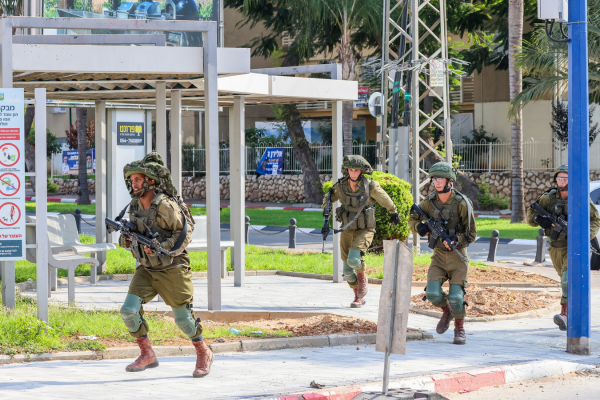“A broken heart is more painful than a bullet in the arm. I know this because I lost my best friend.”
By Pesach Benson, JNS
Twenty-year-old Jonathan Pinto was driving a tank not far from Kibbutz Nahal Oz on Oct. 7 when his vehicle was hit by a missile.
“At first everything turned white, then everything turned black. Then my face started to burn from the heat waves,” he recalls. The explosion left him with shrapnel wounds, severe burns and temporary blindness.
Pinto’s comrades evacuated him to an armored personnel carrier, but it ran over a mine and was attacked by Palestinian terrorists on motorcycles. Despite being unable to see, Pinto, with the help of another soldier, ran three kilometers to safety.
Multiple surgeries followed to remove shrapnel, and after three operations on his eyes, Pinto’s vision, to some extent, has been restored.
Pinto and other soldiers shared their stories in New York at a gala event hosted by Belev Echad on Wednesday. The New York-based nonprofit supports Israeli soldiers wounded in action, providing respite, rehabilitation and emotional support to warriors grappling with the psychological aftermath of warfare and trauma.
While Pinto was blindly trying to reach safety in southern Israel during the attack, 22-year-old Daniel Zaidman and fellow soldiers embarked on a mission to Moshav Netiv Ha’asara on the Gaza border.
Their base had been partially destroyed by Hamas, forcing them to proceed with outdated and partially defective weaponry, he says.
“The death and destruction that met our eyes was indescribable,” Zaidman recounts. “Bodies were strewn everywhere, overturned baby carriages, homes torn apart and turned to rubble. Out of nowhere, terrorists began shooting at us. Tomer, who was sitting beside me, was shot in the head and died instantly, while I took a bullet in the arm. Hours passed before our unit was finally rescued.”
“The very fact that [Daniel] is alive is a huge miracle,” Zaidman’s mother insists.
But Zaidman still lives with the trauma.
“I can’t straighten my fingers, my hand still shakes, and I’m currently in the U.S. receiving medical and psychological treatment for the trauma,” he says. “A broken heart is more painful than a bullet in the arm. I know this because I lost my best friend.”
Rabbi Uriel Vigler, who founded Belev Echad with his wife, Shevy, insists that the organization and its community will be up to the task of helping soldiers wounded in the war with Hamas.
“There are so many prosthetic limbs that we’re going to need, torn hands, torn legs and blind soldiers, but we are here, our community is here,” he said.
